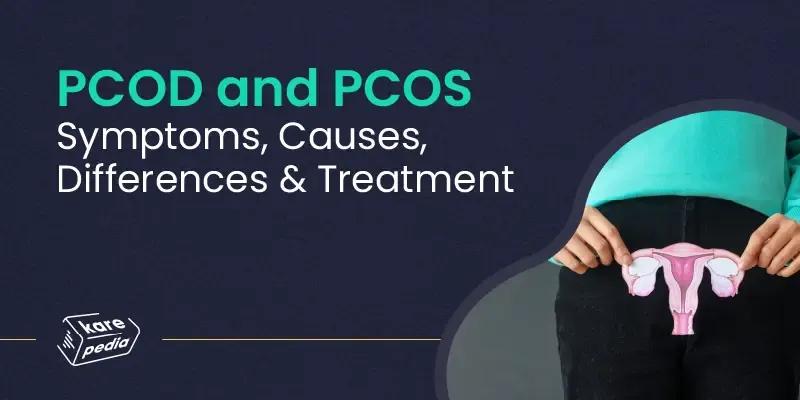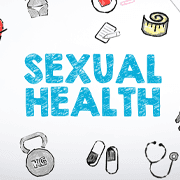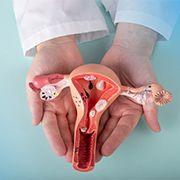PCOD and PCOS - Symptoms, Causes, Differences & Treatment
In This Article
PCOD and PCOS - Symptoms, Causes, Differences & Treatment
Elena
Updated on February 18, 2025
Medically verified by Dr. Arya
Fact checked by Sreemoyee

Wellness
10 minutes
Both conditions are related to hormonal imbalances and can have significant impacts on a woman's health and fertility.
While they share similarities, they are distinct conditions with different implications.
Are you suffering from any of these two conditions? Curious to know more about it?
In this blog, Karepedia aims to provide a clear understanding of PCOD and PCOS, their symptoms, causes, differences, and treatment options.
What is PCOD?
PCOD, or Polycystic Ovary Disease, is a condition where the ovaries produce immature or partially mature eggs in large numbers, eventually developing into cysts.
This can lead to enlarged ovaries that secrete excessive amounts of androgens (male hormones), causing various symptoms.
Symptoms of PCOD
- Irregular periods: Menstrual cycles can be irregular, delayed, or even absent.
- Weight gain: Women with PCOD often struggle with weight gain, particularly around the abdomen.
- Acne and oily skin: Due to excess androgen production, skin problems like acne and oiliness can occur.
- Hair issues: Hair thinning on the scalp and excessive hair growth on the face and body (hirsutism).
- Infertility: Difficulty in conceiving due to irregular ovulation or anovulation (absence of ovulation).
What is PCOS?
PCOS, or Polycystic Ovary Syndrome, is a more severe metabolic disorder compared to PCOD. It involves hormonal imbalances, including increased androgens and insulin resistance, which can affect the entire body.
Symptoms of PCOS
- Irregular menstrual cycles: Similar to PCOD, PCOS can cause infrequent, irregular, or prolonged menstrual periods.
- Weight gain: Significant weight gain and difficulty losing weight, often related to insulin resistance.
- Skin issues: Severe acne, oily skin, and dark patches of skin (acanthosis nigricans).
- Hair problems: Excessive facial and body hair (hirsutism) and thinning hair on the scalp.
- Infertility: Major issues with fertility due to anovulation.
- Metabolic problems: Higher risk of developing type 2 diabetes, high cholesterol, and cardiovascular issues.
Causes of PCOD and PCOS
Both conditions have similar causes, primarily revolving around hormonal imbalances and genetic factors.
- Hormonal imbalance: Both PCOD and PCOS involve excess androgen production. In PCOS, insulin resistance plays a significant role, causing the body to produce more insulin, which in turn leads to more androgen production.
- Genetics: Family history can increase the likelihood of developing these conditions.
- Lifestyle factors: Unhealthy diet, lack of exercise, and stress can exacerbate symptoms and contribute to the development of these conditions.
 10mint
10mintSexual Health Matters: How To Maintain Your Sexual Health ?
 10mint
10mintYour Guide to Sexual Health Screening and Preventive Measures
 10 mints
10 mintsSTDs in Women: Comprehensive Guide on Symptoms and Treatments
Get a Callback Now
Differences between PCOD and PCOS
While PCOD and PCOS are often used interchangeably, they have distinct differences:
- Severity: PCOS is generally more severe than PCOD and involves more systemic metabolic issues.
- Hormonal Impact: PCOS involves a higher level of hormonal imbalance and insulin resistance compared to PCOD.
- Long-term health risks: PCOS has more significant long-term health risks, including type 2 diabetes, cardiovascular diseases, and metabolic syndrome.
- Prevalence: PCOD is more common than PCOS and affects a larger percentage of women.
- Management and Treatment: Both conditions require lifestyle modifications, but PCOS often needs more aggressive medical intervention due to its severity.
Treatment Options
Lifestyle Changes: Both PCOD and PCOS can benefit significantly from lifestyle modifications. These include: BOX
- Diet: A balanced diet rich in whole foods, vegetables, fruits, lean proteins, and healthy fats can help manage symptoms. Reducing sugar and refined carbs is crucial, especially for those with insulin resistance.
- Exercise: Regular physical activity helps in weight management, improving insulin sensitivity, and reducing androgen levels.
- Stress management: Techniques like yoga, meditation, and mindfulness can help manage stress levels, which in turn can help regulate hormonal imbalances.
Medications:
- Hormonal treatments: Birth control pills can help regulate menstrual cycles and reduce androgen levels.
- Metformin: Often prescribed for women with PCOS to improve insulin resistance and regulate blood sugar levels.
- Anti-androgens: Medications like spironolactone can reduce symptoms of excess androgens, such as hirsutism and acne.
- Fertility treatments: For those facing infertility, treatments like ovulation induction medications (e.g., clomiphene citrate) and assisted reproductive technologies (e.g., IVF) can be considered.
Surgical Options:
- In severe cases, laparoscopic ovarian drilling (LOD) may be recommended for women with PCOS.
- This procedure involves using a laser or thin heated needle to destroy parts of the ovary, which can reduce androgen production and improve ovulation.
- Interactive Tips for Managing PCOD and PCOS
- Track your cycle: Use apps or journals to keep track of your menstrual cycle, symptoms, and any changes. This information can be valuable for your healthcare provider.
- Stay active: Find physical activities you enjoy and make them a part of your routine. Consistency is key.
- Eat mindfully: Focus on whole, unprocessed foods and be mindful of portion sizes. Consider consulting a nutritionist for a personalized diet plan.
- Seek support: Join support groups or online communities for women with PCOD or PCOS. Sharing experiences and advice can be empowering and helpful.
- Regular check-ups: Keep up with regular medical check-ups to monitor your condition and adjust treatments as necessary.
PCOD and PCOS are common yet distinct conditions that can significantly impact a woman's health and quality of life. Understanding the differences between the two, recognising symptoms, and seeking appropriate treatment can help manage these conditions effectively.
Lifestyle changes play a crucial role in managing both PCOD and PCOS, and with the right support and medical care, women can lead healthy, fulfilling lives despite these challenges.
Always consult with a healthcare provider for a personalized approach to managing these conditions.
PCOD Overview: Condition where ovaries produce immature eggs leading to cyst formation.
PCOS Overview: Severe metabolic disorder with hormonal imbalances and insulin resistance.
Symptoms of PCOD: Irregular periods, weight gain, acne, hair issues, and infertility.
Symptoms of PCOS: Irregular menstrual cycles, significant weight gain, severe acne, hair problems, and metabolic issues.
Common Causes: Hormonal imbalances, genetic factors, and lifestyle influences like diet and exercise.
Differences: PCOS is more severe, with higher hormonal imbalance and long-term health risks compared to PCOD.
Treatment Options for Both: Lifestyle changes, hormonal treatments, medications like metformin, and surgical options for severe cases.
Lifestyle Modifications: Balanced diet, regular exercise, and stress management are crucial for managing symptoms.
Support and Monitoring: Tracking menstrual cycles, seeking support groups, and regular medical check-ups are important.
Consultation with Healthcare Providers: Essential for personalized treatment plans and effective management of both conditions.

